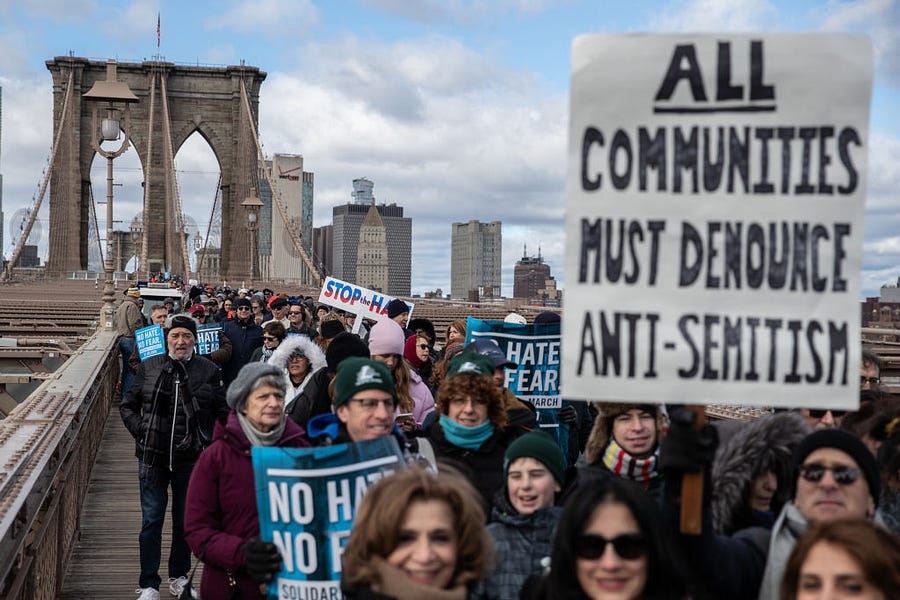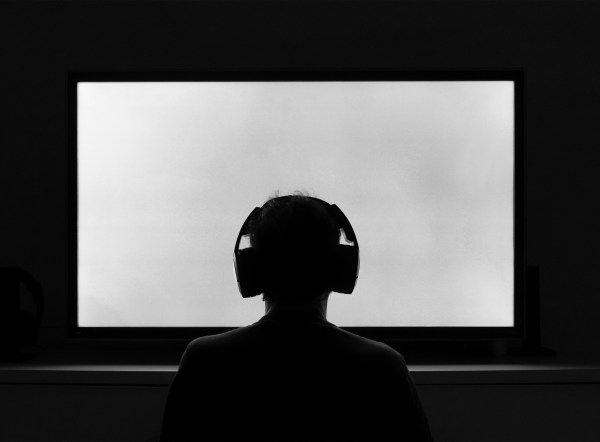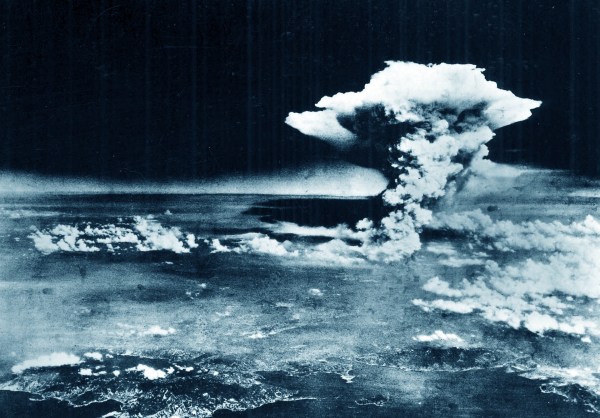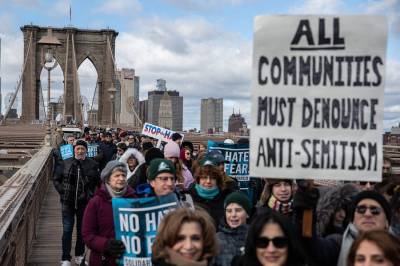The FBI recently reported hate crime data for 2020 showing that Jews remain widely susceptible to attacks. Fifty-eight percent of religiously motivated attacks in 2020 involved Jewish victims, accounting for 9 percent of all hate crimes last year. While those numbers look grim for a group that makes up only about 2 percent of the American population, they actually mark a slight improvement. During pre-pandemic 2019, when more Americans were regularly out and about, 63 percent of religiously motivated hate crimes targeted Jews, making up 13 percent of that year’s total.
The FBI’s crime statistics offer only a partial picture, though. Not only do they not account for non-criminal antisemitic incidents, they also don’t explain what happens after hate crimes are reported. It takes some time for the justice system to address arrestees, so it’s worth looking back to 2019, the last “normal” year for which data exists. New York City offers a good entry point, since NYPD consistently collects hate crime data.
New Yorkers reported 419 hate crimes to the NYPD in 2019. Of those, 242 incidents, or nearly 58 percent, were antisemitic in nature. And among those 242 reported crimes, 121—exactly half—were Brooklyn-based.
The true numbers are surely even higher. A 2020 American Jewish Committee report on domestic antisemitism found that 76 percent of American Jews who had experienced antisemitism in the preceding five years never formally reported their experiences.
New Yorkers absolutely should; the NYPD takes reporting seriously. Their officers made 125 arrests for hate crimes in 2019, 29 of them for antisemitism. But beyond all these numbers, it’s worth asking: Who’s attacking Brooklyn’s Jews, and what happens after they’re apprehended?
Among known attackers, the 29 listed arrests include 25 men and four women. NYPD data characterizes them as black, white, and Asian, and they range from 16 to 47 years old. This is to say, perpetrators have no particular profile.
Eight of the “anti-Jewish” arrests in Brooklyn’s 94th precinct mention a 28-year-old white male, just as three arrests mention a 30-year-old black female in the 71st precinct, and two arrests mention an 18-year-old Asian male in the 66th precinct. NYPD’s press office did not respond to requests for comment, but these could be repeat offenders. As New York state Sen. Simcha Felder told me during a phone interview, “I remember years ago asking, and one of the cops in the unit said that very often it’s the same person that’s repeatedly doing hate crimes.”
What happens to suspects once they’re caught, though? I submitted a Freedom of Information request to the Brooklyn DA in October 2019; the pandemic then delayed my documents. I received information relating to 19 cases, two of which involved the same defendant. My determination letter said six cases weren’t released “because they are sealed,” so it’s unclear if they involved antisemitism.
What is knowable: Among all the released cases the FOIL unit considered responsive to my request, only seven incidents clearly involved antisemitism. Asked why the Brooklyn DA’s office had pursued only seven of 2019’s antisemitic hate crimes, a spokesman emailed, “We process all hate crimes referred to us but apparently police made arrests on only seven cases.”
That’s not quite right, though. There is a drop-off between arrests made and cases pursued. According to NYPD’s arrest data, 11 of the 29 arrests for antisemitic hate crimes happened in the last three months of 2019. In other words, the NYPD had already made at least 18 arrests before I filed my freedom of information request.
Mitchell Silber, executive director of the Community Security Initiative and former director of intelligence analysis for NYPD, told me that cases are unlikely to be prosecuted if the defendant is mentally ill or a juvenile. That presumably explains some of the decline, but not necessarily all.
Since the DA’s office provided information about seven cases though, let’s consider them:
In one, a man drew a swastika on the divider in a school bathroom. No court records exist, and the DA’s Record Access Officer had no further information.
In another, a man spray-painted a swastika on a sidewalk. He had Kings County Supreme Court court dates, but like all the following defendants, it’s hard to know what’s happened. (This taxpayer-funded court requires interested parties to appear in person to request public records.)
In a third, a man screamed "Heil Hitler" and other abusive language, stole the victim’s cell phone from his shirt pocket and threw it “at an oncoming subway train.”
In a fourth, a man beat a Hasidic man’s chest “without provocation.”
In a fifth, a woman approached a kippah and tzitzit-wearing man with a broken bottle, said “Hitler should have killed all of you f**king Jews,” and sprayed an aerosol can at his eyes, causing burning.
In a sixth, three men knocked an Orthodox Jewish man to the ground, punching and kicking him. He suffered forehead and lip lacerations, in addition to "substantial pain and suffering.”
In a seventh, a woman saw four Jewish children playing in their yard and asked, “Are you not allowed to be with me because I’m not Jewish?” The children ran inside screaming. The woman then entered their gated yard, kicked and broke a first floor window, saying, “Jews, Jews, Jews, I am going to smack those kids,” along with other menacing comments.
Notably, this list excludes 64-year old Rabbi Abraham Gopin, who was attacked by a man wielding “a huge brick” while Gopin walked in a park. Gopin was “hospitalized with ‘a broken nose, missing teeth, stitches on his head and lacerations on his body.’” It’s unclear why, since that perpetrator was arrested and named in New York’s (limited) online court records.
Brooklyn’s streets clearly aren’t safe. Who’s responsible? Felder pointed to Mayor Bill de Blasio’s “getting rid of the broken windows policy, and any time crime goes up in general, hate crimes go up.” For his part, Americans Against Antisemitism founder Dov Hikind cited now former Gov. Andrew Cuomo’s embrace of bail reform, which created a 24-hour revolving door for arrestees.
Then there’s the district attorney. Some cases probably weren’t prosecuted because victims opted not to bother. Hikind has a different take, though: “I think people would be willing to pursue if they were encouraged by the DA, but I don’t think the DA is interested in pursuing these cases.”
There’s clearly a gap between arrests and prosecutions. Reflecting on that, Brooke Goldstein, founder and executive director of The Lawfare Project, emailed: “What we are seeing is a systemic problem within our justice system that fails to recognize the severity of antisemitic hate crimes as compared to hate crimes against other minority groups. ... Crimes committed against Jews are often ignored or put aside due to a fundamental misunderstanding of what Jew hatred looks like today.”
Any such misunderstanding could be remedied by communal engagement. However, Felder observed, “In general, the DA’s office in Brooklyn does not have a relationship with the Jewish community at all, and I don’t think they care much about the Jewish community.”
As proof, Felder, who represents Borough Park and Midwood, observed, “‘How many times has the DA’s office been in touch with [my] office over the years?’ The answer is zero. That’s not good—not because I need his attention, but I represent a district that has the largest concentration of Holocaust survivors outside of Israel, so hate crimes take on a bigger significance.”
Felder added, “Iam not by any means, G-d forbid, accusing him of being antisemitic in any way. ... [But] when hate crimes have occurred ... in this district, the Brooklyn DA has not been present ... whereas other times, when things happen in the city he makes sure to be around. ... the Brooklyn DA’s office doesn’t believe the Jewish community is a priority of any sort.”
It’s time for change. The next mayor should prioritize public safety and fully fund the police. New York's new governor should work to reform bail reform. The state legislature should pass legislation modernizing the courts; it’s absurd that the public can’t readily access public information about court proceedings. In general, it shouldn't be so hard for the public to access information about what's happened with reported crimes that directly affect members of the public. And Brooklyn’s district attorney should consistently prioritize antisemitic hate crime prosecutions, as he recently did with two related May 2021 incidents. Because Brooklyn’s Jews, like all other New Yorkers, deserve to live in safety.
Melissa Langsam Braunstein is an independent writer and communications strategist in Washington, D.C. She is on Twitter at @slowhoneybee.






Please note that we at The Dispatch hold ourselves, our work, and our commenters to a higher standard than other places on the internet. We welcome comments that foster genuine debate or discussion—including comments critical of us or our work—but responses that include ad hominem attacks on fellow Dispatch members or are intended to stoke fear and anger may be moderated.
With your membership, you only have the ability to comment on The Morning Dispatch articles. Consider upgrading to join the conversation everywhere.